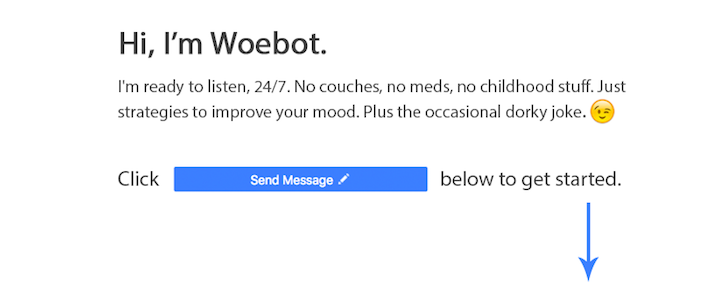Mental Health AI Start-Up Woebot Labs Earns $8M
Why investors like the chatbot. Hint: natural language processing and cognitive behavioral therapy.

Graphics courtesy of Woebot.
If headlines are any judge, Woebot must be pretty popular; the mental health chatbot has garnered many of them, in many main-stage publications. And if money’s any judge, its creator, WoeBot Labs, must be pretty happy.
Today, less than a year after its launch, the San Francisco-based start-up announced the closure of an $8 million Series A funding round, which will aid the development of its artificial intelligence (AI) and expand care delivery. The venture capital engine New Enterprise Associates supported the drive, along with the AI Fund, a project of Andrew NG, an AI expert and Stanford University professor, according to Woebot Labs.
“Our funding marks a new chapter for Woebot as we work to constantly improve the overall experience for users,” founder and CEO Alison Darcy, PhD, a clinical psychiatrist with roots at Stanford, said in a statement. “Considering the immense human and economic costs associated with mental health problems, it’s crucial that we meet this challenge head on.”
So, what’s Woebot’s deal? It is a mental health chatbot built on natural language processing and cognitive behavioral therapy, leveraging research as it strives to help people and society at large. The technology analyzes private exchanges with users to craft a “self-guided” version of the therapy, according to the company.
Woebot is available in the App Store, but it won’t reach Android users until early this month. The AI also lives on Facebook Messenger, a platform to which other chatbot creators have migrated. The tool doesn’t cost any money.
In total, Woebot fields more than 2 million messages per week and reaches 130 countries, according to the company. Over the last quarter, it saw 50% month-over-month growth.
The brains behind Woebot don’t view the technology merely as a means to make money. They aim to “democratize” mental health care, and supporters like Ng have big dreams when it comes to the potential of digital health and technology.
“In the coming years, AI will impact almost every industry, and digital mental healthcare is poised to see a significant transformation,” Ng said in a statement. “Woebot brings a unique combination of clinical research, domain experts, and AI to address the mental health crisis and improve people’s daily lives, and I’m thrilled that they’re one of the first investments for the AI Fund.”
Related
Pear Therapeutics and Novartis Will Collaborate on Prescription-Strength Apps
How the 1st Pharma Chat Bot Came to Life
Candor Hopes to Democratize Health Insurance Market with New App
Podcast: Adoption of Healthcare Tech in the Age of COVID-19 with Dr Kaveh Safavi
June 22nd 2021Kaveh Safavi, MD, JD, global health lead of Accenture Health, discusses how the pandemic influenced the speed at which healthcare organizations adopted new technologies and how this adoption is impacting patient care.